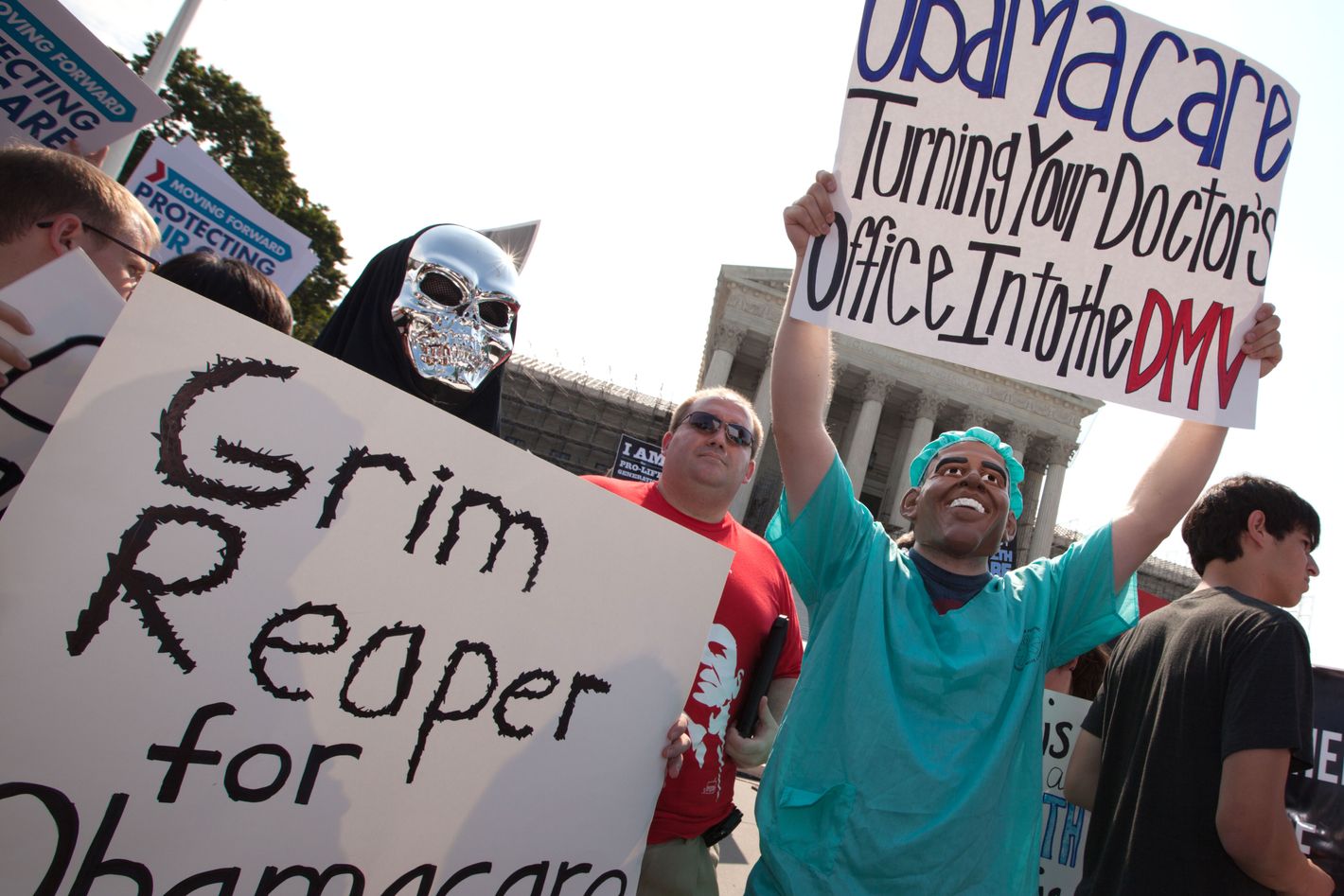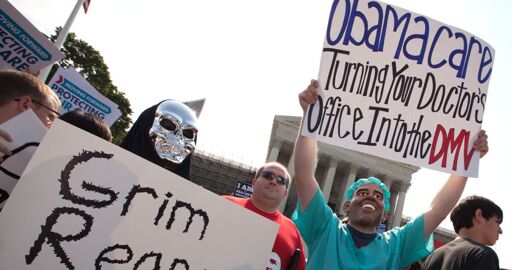
Photo: Stephen J. Boitano/LightRocket/Getty Images
This week, the current federal-government shutdown will become the third-longest ever, surpassing a 2013 shutdown that lasted 16 days. There are some significant echoes of the 2013 shutdown, which stemmed from a failed Republican effort to “defund” Obamacare just as that health-reform initiative was being fully implemented. Now the shoe is on the other foot: Democrats are demanding that Obamacare subsidies, which were significantly expanded in 2021, be extended. Without congressional action, upwards of 20 million Americans will see a huge Obamacare premium hike at the end of the year.
The focus on the Obamacare subsidies does create a somewhat simpler path to the end of the shutdown compared to the broader series of disagreements that fed it. Democrats originally demanded a host of concessions, including cancellation of Medicaid cuts enacted in the One Big Beautiful Act and an end to Office of Management and Budget director Russell Vought’s power-grabbing cancellations of previously authorized spending. Democrats appear to have narrowed their focus. And for their part, Republicans seem to have backed down on the deeper spending cuts many wanted instead of the “clean CR” that keeps the government open by maintaining current spending levels.
So a deal on Obamacare subsidies could be all it takes to reopen the government. Unfortunately, reaching a compromise won’t be easy. Here, the key issues standing in the way of a deal.
Who blinks first?
Republicans say they won’t formally negotiate on Obamacare subsidies until Democrats agree to reopen the government. Democrats say they won’t supply the votes needed to reopen the government until an Obamacare-subsidy deal is reached. So obviously, something has to give.
The simplest way out is some sort of framework agreement that’s not a formal deal but that commits Republicans to a subsidy extension. However, such an agreement would have to include a lot of specifics to even be minimally acceptable to Democrats — and a lot of Republicans would likely object to that. Congressional leaders are acutely aware that each party’s base is watching closely for a possible betrayal with Democrats demanding a clear victory and Republicans resurfacing years of intense hatred of Obamacare. To put it mildly, levels of trust between Democrats and Republicans are at an all-time low. And the primary source of mistrust (on both sides, really) is a president who considers himself the greatest deal-maker ever.
What does Trump want?
Democrats won’t trust any interim deal on Obamacare subsidies unless it is explicitly endorsed by Donald Trump. And Republicans won’t agree to one unless it’s imposed on them by the president. Trump initially expressed interest in doing something about the subsidies, presumably because he doesn’t want to get blamed for huge premium hikes. But he has since become preoccupied with the twin goals of seeking recognition as the greatest peacemaker in world history and of crushing domestic opposition to his agenda by every means available (including military deployments).
So does Trump even want the government to reopen anytime soon? It’s pretty clear that Vought doesn’t since the shutdown has given him a fresh opportunity to lay off federal employees in agencies deemed hostile or irrelevant to Trump 2.0. But it’s impossible to envision an end to the current stalemate in which the president doesn’t play a central and decisive role.
What limits will each side accept?
Reaching a compromise on the expiring Obamacare credits wouldn’t be easy even if the government weren’t shut down. Republicans almost unanimously view the 2021 subsidy extension as just another wasteful and fiscally irresponsible Biden-administration measure that contributed to inflation and gave benefits to middle-class (and even upper-middle-class) families that didn’t need them. Democrats typically view the expansion (and Obamacare itself) as a way station to universal health coverage. In addition, both Trump and congressional Republicans have insisted on inflaming the subsidy debate by inventing an “illegal immigrants” problem that doesn’t actually exist, which in turn will make their MAGA base even more adamantly opposed to a deal that doesn’t somehow punish immigrants.
Democrats may accept some restrictions on an extension, like an income cap for recipients or a minimum out-of-pocket premium. But there will be strong differences between the parties over the length of the extension.
The real problem is that both parties need to be able to spin any deal as a victory. That’s particularly true for Democrats, who need to give a trophy to the base while justifying the pain associated with the shutdown.
Will abortion complicate negotiations?
In Republicans’ last-ditch efforts to kill or hobble Obamacare, they focused on specious arguments that the health-care overhaul would subsidize abortions (despite abundant provisions in the Affordable Care Act designed to avoid any direct payments for abortion services). These claims are coming up again as the anti-abortion movement tries to show it is still relevant in national politics in the post-Roe era despite Trump’s insistence that abortion is strictly a state issue now.
Democrats may reject new abortion language in an Obamacare subsidy extension categorically. As Politico reports, “Sen. Jeanne Shaheen of New Hampshire, the top Democratic negotiator on the issue, and Sen. Ron Wyden of Oregon, the senior Democrat on the tax-writing Finance Committee, have already indicated that abortion restrictions are a nonstarter for any deal on the larger issue.” The last thing Congress needs right now is another polarizing issue, but the GOP base may disagree.
How will a deal impact the midterms?
Beyond all the smaller issues, Democrats will worry that any deal on an Obamacare subsidy extension neutralizes it as a midterms campaign issue. The GOP will get at least partial credit for addressing the premium crisis, and the powerful Democratic argument that Republicans are determined to deny health-care coverage to as many Americans as possible will become more complicated to make. It’s all the more reason that Democrats will want to insist they forced a deal on Republicans, even as Republicans insist Democrats caved.
It’s the muddiest terrain possible for a deal.
More on the Government Shutdown
Airports Are Refusing to Air Kristi Noem’s Weird Shutdown VideoMTG Blows Up GOP Shutdown Message With Health-Care RantWill Air-Traffic Controllers End the Government Shutdown?
From Intelligencer - Daily News, Politics, Business, and Tech via this RSS feed

